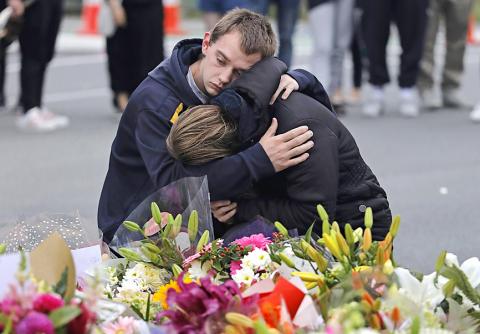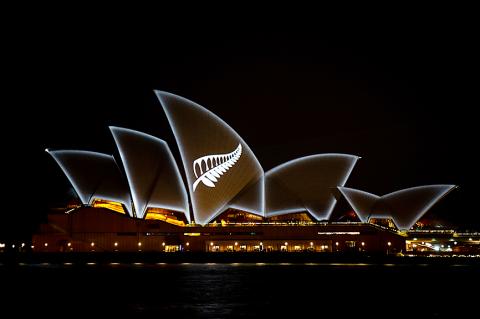The man charged over the horrifying attacks on New Zealand mosques flashed a white power gesture as he appeared in court yesterday, while a shellshocked community began digging graves for the 49 people he stands accused of slaying.
Australia-born 28-year-old Brenton Tarrant stood largely impassive in the dock wearing handcuffs and a white prison smock as the judge read the first of what are expected to be a host of murder charges he is likely to face.
Flanked by armed police, the former personal fitness trainer gestured an upside-down “okay” — a symbol used by white power groups worldwide.

Photo: AP
He did not request bail and was remanded in custody until an April 5 court appearance.
Outside the courtroom, Christchurch residents struggled to deal with the aftermath of what is thought to be the worst act of terror against Muslims in the West.
Nearby, excavators were called in to remove the vast amount of earth needed to bury the dead, although police have not yet released the bodies to anxious families.

Photo: EPA-EFE
In a nearby hospital, doctors worked round the clock to treat 39 people for gunshot wounds and other injuries sustained in the attacks.
The wounded included a two-year-old boy and a four-year-old girl, who was in critical condition.
The attack on the Al Noor and Linwood mosques has prompted an outpouring of grief and deep shock in a usually peaceful country, which prides itself on welcoming refugees fleeing violence or persecution.
Throughout the day people laid flowers at a makeshift memorial just beyond the police cordon around the Al Noor mosque, where most of the people died.
Many offerings were accompanied by handwritten letters laden with sadness and disbelief, from residents of what one local driver called the “city of sorrow.”
Across New Zealand, Kiwis responded with interfaith solidarity — crowdfunding millions of dollars, donating halal food and even offering to accompany local Muslims now scared to walk the streets.
Muslims make up just 1 percent of New Zealand’s population.
New Zealand Prime Minister Jacinda Ardern arrived in the city and, wearing a black headscarf, met with survivors and victims’ families.
Ardern said the victims came from across the Muslim world, with Turkey, Bangladesh, Indonesia and Malaysia among the countries rendering consular assistance.
At least one Saudi citizen and two Jordanians were among the dead, while five Pakistani citizens were missing.
Police are trying to piece together answers to the difficult questions of why and how this happened.
They want to know how it was possible for the perpetrator to remain undetected by the intelligence services, despite his extremist views.
Ardern said the shooter was “in possession of a gun license” obtained in November 2017, and he started legally purchasing two semi-automatic weapons, reportedly AR-15s, two shotguns and a lever-action gun the following month.
“I can tell you one thing right now — our gun laws will change,” she said.
The suspect documented his radicalization and two years of preparations in a lengthy, meandering and conspiracy-filled “manifesto.”
He livestreamed footage of himself going room-to-room, victim to victim, shooting the wounded from close range as they struggled to crawl away in the main Christchurch mosque.
Thirty-six minutes after the police received the first call, Tarrant was in custody.
Two other people remain in custody, although their link to the attack is not clear.
One man, 18-year-old Daniel Burrough, has been charged with incitement.
Revulsion at the attack and tributes to the victims poured in from around the world.
President Tsai Ing-wen (蔡英文) on Friday tweeted her condolences, saying: “I’m utterly saddened by the mass shooting in Christchurch, #NewZealand. My thoughts go to the victims & their families.”
“My warmest sympathy and best wishes goes out to the people of New Zealand after the horrible massacre in the mosques,” US President Donald Trump wrote on Twitter.
“With this attack, hostility towards Islam that the world has been has been idly watching and even encouraging for some time, has gone beyond the boundaries of individual harassment to reach the level of mass killing,” Turkish President Recep Tayyip Erdogan said.
Israeli Prime Minister Benjamin Netanyahu said that Israel “mourns the wanton murder of innocent worshipers in Christchurch and condemns the brazen act of terror.”
Norwegian Prime Minister Erna Solberg urged the international community to combat all forms of extremism, saying the Christchurch attacks revived painful memories of the 2011 mass killings by Anders Behring Breivik.
At Friday prayers in Jerusalem’s Al Aqsa mosque, Grand Mufti Muhammad Ahmad, the city’s highest Muslim authority, urged worshipers to hold special prayers for the victims of the attacks.
In Rome, Pope Francis assured “all New Zealanders, and in particular the Muslim community, of his heartfelt solidarity,” saying that he was deeply saddened by such “senseless acts of violence.”
Additional reporting by AP

NATIONAL SECURITY THREAT: An official said that Guan Guan’s comments had gone beyond the threshold of free speech, as she advocated for the destruction of the ROC China-born media influencer Guan Guan’s (關關) residency permit has been revoked for repeatedly posting pro-China content that threatens national security, the National Immigration Agency said yesterday. Guan Guan has said many controversial things in her videos posted to Douyin (抖音), including “the red flag will soon be painted all over Taiwan” and “Taiwan is an inseparable part of China,” while expressing hope for expedited “reunification.” The agency received multiple reports alleging that Guan Guan had advocated for armed reunification last year. After investigating, the agency last month issued a notice requiring her to appear and account for her actions. Guan Guan appeared as required,

Japan and the Philippines yesterday signed a defense pact that would allow the tax-free provision of ammunition, fuel, food and other necessities when their forces stage joint training to boost deterrence against China’s growing aggression in the region and to bolster their preparation for natural disasters. Japan has faced increasing political, trade and security tensions with China, which was angered by Japanese Prime Minister Sanae Takaichi’s remark that a Chinese attack on Taiwan would be a survival-threatening situation for Japan, triggering a military response. Japan and the Philippines have also had separate territorial conflicts with Beijing in the East and South China

A strong cold air mass is expected to arrive tonight, bringing a change in weather and a drop in temperature, the Central Weather Administration (CWA) said. The coldest time would be early on Thursday morning, with temperatures in some areas dipping as low as 8°C, it said. Daytime highs yesterday were 22°C to 24°C in northern and eastern Taiwan, and about 25°C to 28°C in the central and southern regions, it said. However, nighttime lows would dip to about 15°C to 16°C in central and northern Taiwan as well as the northeast, and 17°C to 19°C elsewhere, it said. Tropical Storm Nokaen, currently

PAPERS, PLEASE: The gang exploited the high value of the passports, selling them at inflated prices to Chinese buyers, who would treat them as ‘invisibility cloaks’ The Yilan District Court has handed four members of a syndicate prison terms ranging from one year and two months to two years and two months for their involvement in a scheme to purchase Taiwanese passports and resell them abroad at a massive markup. A Chinese human smuggling syndicate purchased Taiwanese passports through local criminal networks, exploiting the passports’ visa-free travel privileges to turn a profit of more than 20 times the original price, the court said. Such criminal organizations enable people to impersonate Taiwanese when entering and exiting Taiwan and other countries, undermining social order and the credibility of the nation’s